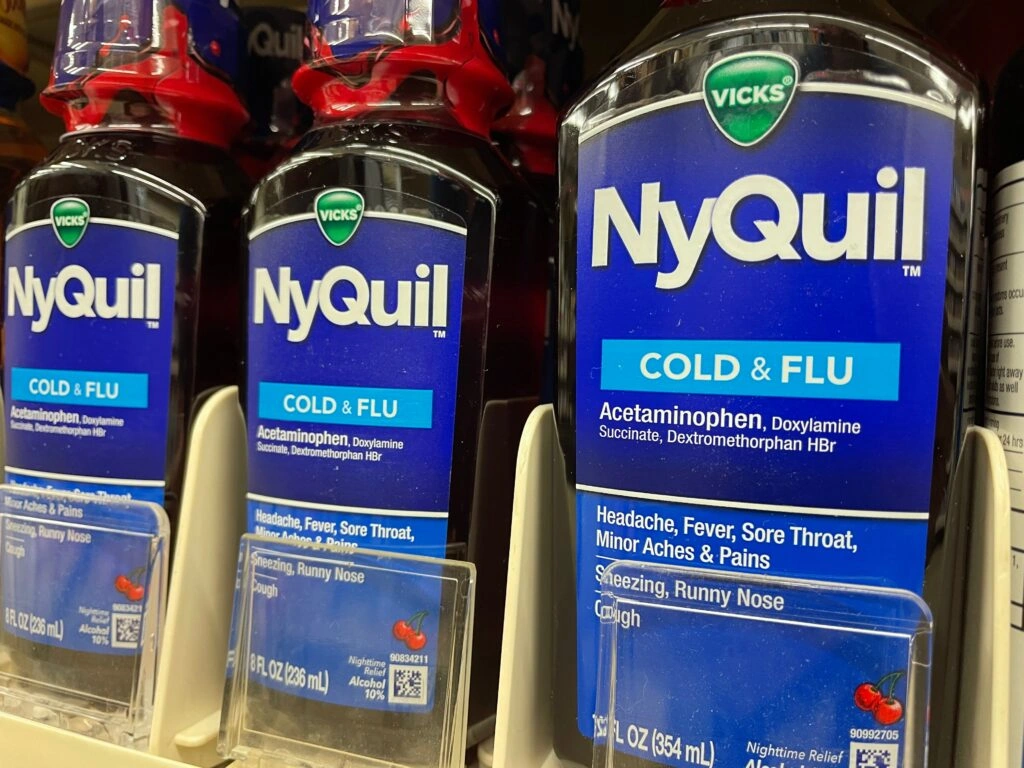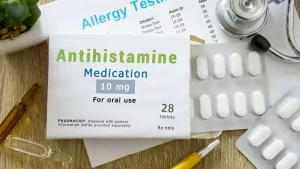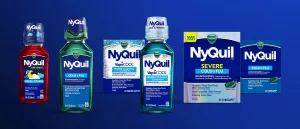
That Stuffy-Nose Trap
Let’s be real for a second: allergies and seasonal crud turn us into professional nose-blowers. But have you ever stopped to wonder if your favorite rescue tools—like NyQuil at bedtime, or that trusty nasal spray—might actually be double-crossing you?
The numbers don’t lie: a whopping chunk of folks who lean too hard on nasal decongestant sprays (Afrin, I’m looking at you) wind up with rebound congestion that’s worse than where they started. As in, “I just survived a week of nose drama and now I’m back to square one.” Fun, right?
So if you’re lying awake at 2 AM, sniffling, holding NyQuil in one hand and your nasal spray in the other…I get it. I’ve been there. Question is—can you mix them, or are you just setting yourself up for a misery encore? Time to get into the nitty-gritty (with a dash of real-life chaos and a sprinkle of solid science, promise).
Nasal Sprays: Friend or Foe?
Which Kind’s In Your Cabinet?
First things first—what exactly are you squirting up your nose? Don’t worry, most of us just grab the bottle and hope for miracles, but not all sprays are alike.
Here’s the quick and dirty:
- Decongestant sprays (like Afrin) work fast, shrinking those angry blood vessels and letting you breathe again. Downside? They’re only meant for short bursts—a few days, max—unless you want your congestion to snap back even meaner (according to Mayo Clinic experts).
- Steroid sprays (like Flonase) go for the long game, slowly calming inflammation. These don’t cause rebound congestion, but they need a few days to work.
True Story—The Spray Loop
Quick anecdote break: One spring, I was desperate for relief and hit the Afrin twice a day…for a week straight (don’t judge, I was in survival mode). The next thing I knew, my nose slammed shut so bad I sounded like Darth Vader. Turns out, that’s textbook rebound congestion. Who knew you could basically become addicted to breathing?
Moral: Even quick-fix sprays can backfire if you lean on them too hard. If you’ve ever worried about how long after Afrin can I take nyquil, you’re not alone—and honestly, it’s a smart question to ask.
NyQuil and Nasal Spray: Double Trouble?
Okay, But…What’s Really Inside?
Let’s be honest: NyQuil’s label reads like a mysterious potion—acetaminophen, dextromethorphan, doxylamine, phenylephrine. Decongestant sprays typically pack oxymetazoline, while steroid sprays have things like fluticasone or triamcinolone (learn more about these active ingredients).
The key here? Some overlap—especially with decongestants—means you can accidentally double up on similar ingredients. When that happens, your heart rate can spike, your blood pressure can shoot up, and you might just feel jittery, dizzy, or plain weird (health experts point out this risk).
Here’s a Cheat Sheet:
| Spray Type | Mix with NyQuil? | Main Risk |
|---|---|---|
| Decongestant (Afrin) | Caution – sparingly | Double dose of decongestants = heart & blood pressure risks |
| Steroid (Flonase) | Usually safe | May add drowsiness, otherwise few interactions |
| Saline/Plain Rinse | Safe | None |
When to Worry?
Mixing decongestant sprays like Afrin with NyQuil (which sometimes contains phenylephrine, another decongestant) is where things get sketchy. The combo can rev up your system, especially if you have blood pressure, heart, or thyroid issues (as detailed here). It’s kind of like trying to fix a leaky faucet by stuffing it with more and more tape—you might buy some time, but you’re only making the problem worse in the long run.
Honestly, I once ignored this and got a rapid heartbeat for my trouble. Not fun. So if you’re reaching for both, maybe pause for a second and think it through…
Timing Is Everything
Can I Take NyQuil After Using Nasal Spray? Not Always Simple.
So, what’s the actual answer?
If your nasal spray is a steroid like Flonase—taking NyQuil is probably fine. Both go their own way in your body and don’t really clash (except you might feel a bit extra sleepy).
But if you’re using a decongestant spray like Afrin, things get dicey. Using both at the same time can mean:
- Piling decongestant on decongestant (overload city)
- More side effects: racing heart, feeling anxious or dizzy, insomnia
- Making rebound congestion worse if you push the spray past 3 days
The best move? Give your body a few hours between doses. Avoid doubling up on similar ingredients. And definitely don’t stretch your decongestant spray use beyond 3 days—seriously, that rebound stuff is real (here’s more proof).
If you have specific questions about how long after Afrin can I take nyquil, that guide is honestly a must-read. It covers the timing thing in way more detail (and less guesswork).
Other Meds in the Mix?
DayQuil is the daytime cousin of NyQuil, and if you’re already bouncing between those and Afrin, you’re not alone. (“Can I take Afrin and dayquil together?” literally pops up in searches all the time, so you’re in good company.)
Short answer? Mixing them is a “sometimes, but not always” move. You need to check the labels—if both have a decongestant, skip the combo. Otherwise, keep it to the shortest stint possible, and never go over the top. If you’re genuinely unsure, this article (Can I take Afrin and dayquil together) spills all the details.
Making Better Choices (So You Actually Sleep)
What’s the Exit Ramp?
If you’re feeling trapped in a cycle of stuffy nights and scary side effects, it’s time for a reality check.
- Saline Sprays – They don’t pack medicine, so no rebound effect. They just wash out gunk and open things up a bit, especially before bed.
- Humidifiers – Dry air makes things worse. Humidifiers might not be magical, but they help keep your nose from feeling like concrete.
- Antihistamines – If sniffles are allergy-fueled, swap decongestants for an antihistamine (think loratadine or cetirizine). Less sinus blow-out, more long-term chill.
I once switched out my beloved decongestant spray for a neti pot and a humidifier during peak pollen season…and, full confession, my nose hated me for 48 hours. But then I actually started waking up able to breathe. Sometimes you just need to rip off the (metaphorical) bandage.
Table: Alternatives When You Need Relief (But Want to Sleep)
| Option | Pros | Cons |
|---|---|---|
| Saline spray or rinse | No meds, no rebound congestion, safe with NyQuil | Not as dramatic as decongestants; needs consistency |
| Antihistamines | Great for allergies; fewer risky interactions | Can bring drowsiness or dry mouth |
| Humidifier | Makes breathing less harsh, especially at night | Requires cleaning and upkeep |
If you want more scoop on those medication combos, especially for DayQuil/NyQuil and sprays, check this out: Can I take Afrin and dayquil together? There’s a reason why medical pros and pharmacists harp on this—overlapping active ingredients sneak in more easily than you think.
Critical Reminders (and Little Pep Talks)
Read, Wait, Ask
The best “hack” I can offer? Read the backs of bottles, wait between doses, and—when in doubt—ask your pharmacist. No shame in double-checking. We can’t all memorize what dextromethorphan does at 2 AM, right?
Also…if you start getting pounding heartbeats, feel faint, or notice weird symptoms, don’t just “tough it out.” That’s your body waving a red flag. If you’re managing chronic stuff (blood pressure, thyroid, asthma), always get your provider’s blessing before mixing cold meds (see more in this breakdown).
Honest Reflection
Have you ever gone “all in,” mixing anything and everything just to get a decent night’s sleep? (Yup, me too…and that’s why I verify now instead of guessing.) If you’ve ever found yourself tiptoeing into the “medication overlap” zone, it’s okay. Awareness is the first step to fewer long, congested nights.
Wrapping It Up: Breathe Easy, Friend
Let’s sum it up—the answer to “Can I take NyQuil after using nasal spray?” is…sometimes yes, sometimes no. If your spray is a steroid (Flonase, Nasacort), you’re likely fine, with just extra drowsiness to watch. For those potent decongestant sprays (Afrin, etc.), don’t double up with NyQuil, especially if the spray is still fresh in your system. Side effects—the racing heart, restless sleep, or worse—are an all-too-real risk.
Stick to decongestant sprays for no more than three days. If you’re ever uncertain or if your health is complicated, your pharmacist or doctor is your best resource. No judgment—just smart moves for feeling better. Try saline sprays, a steamy shower, or antihistamines instead, and see if that helps break the stuffy cycle.
Most importantly—know that you’re not alone in this tangle of meds and sniffles, and you really can find a rhythm that works for you…minus the heart palpitations and late-night Googling. Go easy, be patient with your body, and don’t be afraid to ask questions (here or at the pharmacy). Have you ever gotten stuck in the congestion loop? What worked for you? I’d love to hear about it below—maybe we can all breathe a bit easier together.
























Leave a Reply
You must be logged in to post a comment.